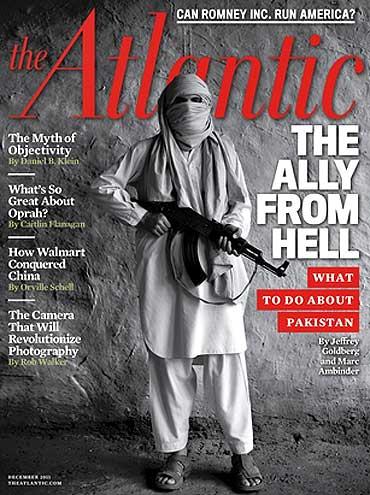
Yusuf Raza Gilani, despite being Pakistan's elected prime minister, has little or no control over the country's nuclear arsenal and the armed forces, explains Amir Mir
If Pakistan ever comes close to launching a nuclear warhead, the final say would be with the all-powerful army chief, even though in theory the prime minister's finger should be on the trigger, as he is the chairman of the Nuclear Command Authority which handles the command and control of the country's strategic nuclear forces and organisations.
While the United States has officially refuted some recent international media reports questioning Pakistan's nuclear safety mechanisms, saying that its security measures are state-of-the-art, it is the country's army tops brass which will take a final decision about employing the nuclear option.
The fresh controversy over the safety of Pakistan's nuclear mechanism was set off with the publication of a title story in the December 2011 issue of a leading US magazine, The Atlantic. Titled The Ally from Hell, the report described Pakistan as an unstable and violent country located at the epicenter of global jihad, which might not be the safest place on earth to warehouse 100 plus nuclear weapons.
Tagging Pakistan as an obvious place for a jihadi organisation to seek a nuclear weapon or fissile material, the article said that the Pakistani military and security services are infiltrated by an unknown number of jihadi sympathisers. The Atlantic pointed out three key threats to Pakistan's nuclear programme -- a terrorist theft of a nuclear weapon, transfer of a nuclear weapon to another state like Iran and a takeover of nuclear weapons by a militant group during a period of instability.
The US magazine then claimed: "A country that is home to the harshest variants of Muslim fundamentalism, and to the headquarters of the organisations that espouse these extremist ideologies, including Al Qaeda, the Haqqani network, and Lashkar-e-Tayiba, nuclear bombs capable of destroying entire cities are transported in delivery vans on congested and dangerous roads. And Pakistani and American sources say that since the raid on Abbottabad [in May this year to kill Osama bin Laden], the Pakistanis have provoked anxiety inside the Pentagon by increasing the pace of these movements. In other words, the Pakistani government is willing to make its nuclear weapons more vulnerable to theft by jihadis simply [in a bid] to hide them from the United States, the country that funds much of its military budget".
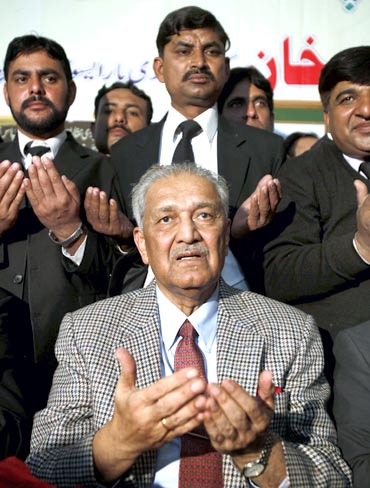
The Pakistani Foreign Office simply dismissed the apprehensions expressed in the cover story of The Atlantic as pure fiction, baseless and motivated, adding that the Pakistani nuclear arsenal was absolutely safe under multi-layered custodial controls.
"The surfacing of such campaigns is not something new. It is orchestrated by quarters that are inimical to Pakistan," said a November 6 statement issued by the Foreign Office spokesperson in Islamabad.
Approached for comments, highly-placed circles in the ministry of defence said that in the aftermath of the 9/11 terror attacks in 2001 and the nuclear proliferation charges levelled against Dr A Q Khan in 2003, Pakistani authorities have taken a series of drastic steps to improve the institutional frameworks and operational procedures for its nuclear arsenal, with a view to prevent any further proliferation of nuclear-related technologies and materials.
The defence ministry circles further confirmed reports that the Pakistani authorities are training 8,000 additional people to protect the country's nuclear arsenal.
A Pakistani military spokesman, in a written statement which was released on November 6, 2011 in conjunction with the graduation of 700 of these security personnel, stated, "This group comprises hand-picked officers and men who are physically robust, mentally sharp and equipped with modern weapons and equipment. Extensive resources have been made available to train, equip, deploy and sustain an independent and potent security force to meet any and every threat emanating from any quarter. The graduation ceremony was attended by Major General Muhammad Tahir, the head of the security for the Strategic Plans Division, the arm of the Pakistani military which is tasked with protecting the nuclear arsenal".
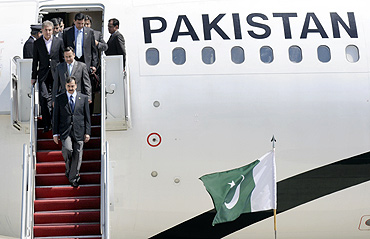
Officials in the ministry of defence say the credibility of their claims about the country's nuclear safety mechanism can be gauged from the fact that these have been endorsed by none other than the Obama administration. They recalled that in an official statement released on November 7, the US embassy in Islamabad has supported Pakistan while denying the title story of The Atlantic.
"The US government's views have not changed about nuclear security in Pakistan. We have confidence that the Pakistan government is well aware of the range of potential threats to its nuclear arsenal and has accordingly given very high priority to securing its nuclear weapons and materials effectively. Pakistan has a professional, highly motivated, and dedicated security force that fully understands the importance of nuclear security," said the US embassy in Islamabad in its statement.
US embassy spokesman Mark E Stroh recalled, "President Obama had declared in March 2010 during the Nuclear Security Summit: I feel confident about Pakistan's security around its nuclear weapons programmes".
According to a 2001 US Department of Defence report, Islamabad's nuclear weapons are stored in component form, which suggests that the nuclear warheads are stored separately from delivery vehicles. Some reports say the fissile cores of the Pakistani weapons are separated from the non-nuclear explosives. But whether this is actually the case is unclear; one report states that the warheads and delivery vehicles are probably stored separately in facilities close to one another, but says nothing about the fissile cores.
According to an account of a 2008 experts group visit to Pakistan, Lieutenant General Khalid Kidwai, the head of the Strategic Plans Division, suggested that the nuclear warheads (containing the fissile cores) may be mated with their delivery vehicles.
According to Kidwai, the SPD's official position is that the nuclear weapons will be ready when required, at the shortest notice; but the Pakistani doctrine is not endorsing a US-USSR model with weapons on hair trigger alert. Likewise, the 2001 US Defence Department report clearly stated that Pakistan can assemble its weapons fairly quickly.
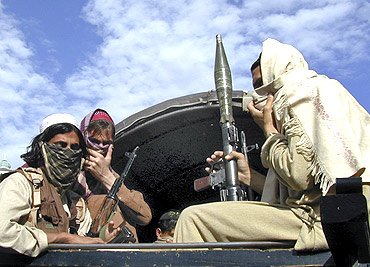
Central Intelligence Agency chief General David Petraeus, who had earlier been the commander of the US Forces in Afghanistan, told the Senate Armed Services Committee on March 15, 2011, "There is quite considerable security for the Pakistani nuclear weapons".
Asked about the security of Pakistan's weapons following the May 2011 fidayeen attack on the Mehran Naval base in Karachi, US Assistant Secretary of State Robert Blake had stated in Washington on June 21, 2011, "There is much more heightened security around Pakistan's nuclear weapons facilities than at the Karachi naval base".
However, it appears that the American knowledge of Pakistani nuclear arsenal remains quite limited. For example, former Chairman of the US Joint Chiefs of Staff Admiral Mike Mullen had stated last year: "We are limited in what we actually know about Islamabad's nuclear arsenal".
Similarly, former CIA chief Leon Panetta acknowledged in a May 18, 2010 speech that the United States does not possess the intelligence to locate all of Pakistan's nuclear weapons-related sites. Therefore, despite repeated claims by Islamabad about the safety of its nuclear arsenal which have been endorsed by top government officials in the White House, the US has continued to monitor Pakistan's nuclear programme.
Information acquired by the US State Department about Pakistan's nuclear programme [which had been made public by WikiLeaks while leaking cables in December 2010] showed that there are 120,000-130,000 people directly involved in Pakistan's nuclear and missile programmes who are working in these facilities and protecting them. The cable acknowledged that Pakistan has evolved a well-structured system of security for its nuclear programme but added that the doubts about the nuclear programme of the only Muslim nuclear state are not dying out.
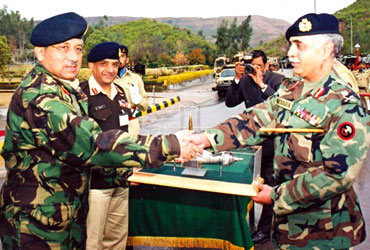
The State Department cable claimed that Russians, like the Americans, Europeans, Indians and Israelis, raise their concern that these nukes might go into the hands of what they call Islamic extremists. The cable said that the Pakistani nuclear programme involves 120,000 to 130,000 men but suspected that any one of them could be an extremist.
Yet the defence ministry circles in Islamabad insist that all key international regulatory authorities, including the International Atomic Energy Agency, have already acknowledged the efficacy of Pakistan's comprehensive command and control structure which has made its nuclear assets impervious to any threat, both internal and external.
Over the past decade, Pakistani authorities have instituted numerous advanced security mechanisms, from tightened physical safety to technical controls on the nuclear weapons themselves. Pakistan's command and control over its nuclear weapons is believed to be compartmentalised and includes strict operational security. The system is based on command, control, communication, computers, intelligence, information, surveillance and reconnaissance.
After then army chief General Pervez Musharraf toppled the civilian government in 1999 to become a president in uniform, Pakistan's key nuclear institutions were placed under a unified control of the National Command Authority. The Authority was made responsible for policy formulation which exercises employment and development control over all strategic nuclear forces and organisations.
While the decision-making power pertaining to the nuclear deployment was given to the NCA, General Musharraf made the office of the President all powerful by making him cast the final vote to order a nuclear strike in his capacity as the NCA chairman and the supreme commander of the country's armed forces. The prime minister was the vice chairman of the NCA in that set-up.
However, after the 2008 general elections and the subsequent exit of Pervez Musharraf, the new President, Asif Ali Zardari, decided to transfer the control of the country's nuclear weapons to the Prime Minister Yusuf Raza Gilani. In a bid to establish civilian command over the nuclear arsenal, the National Assembly passed the National Command Authority Bill on January 28, 2010, primarily to place the NCA under the control of the elected prime minister.
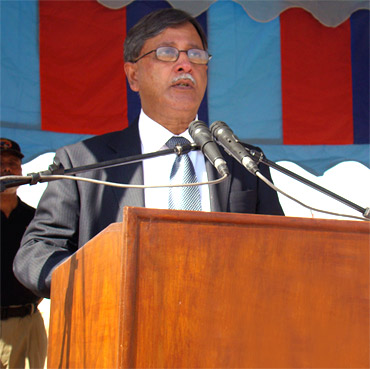
As things stand today, the prime minister, as head of government, is chairperson of the NCA. The NCA also includes the chair of the Joint Chiefs of Staff; the ministers of defence, interior, and finance; the director general of the SPD; and the commanders of the army, air force, and navy.
The final authority to launch a nuclear strike requires consensus within the NCA; the chairperson (prime minister in this case) must cast the final vote. But there are those in the Pakistani security establishment who still believe that passing the chairmanship of the NCA from the president to the prime minister hardly makes any practical difference to the country's nuclear programme, which remains under the firm control of the mighty military establishment.
Technically speaking, Pakistan's nuclear control and command system is based on a three-tier structure: the National Command Authority, the Strategic Plans Division and the Services Strategic Forces Command. The NCA, which has ten members, with the prime minister as its chairman, is responsible of formulating policies, deploying the strategic forces, coordinating activities of all strategic organisations, negotiating arms control/disarmament, supervising the implementation of export controls and safeguarding nuclear assets and sites.
The NCA has two committees: the Employment Control Committee and the Development Control Committee. The ECC is responsible for directing policy-making during peace time and deployment of strategic forces during war time, making recommendations on the evolution of nuclear doctrine, establishing the hierarchy of command and the policy for authorising the use of nuclear weapons, and establishing the guidelines for an effective command and control system to safeguard against accidental or unauthorised use. The DCC is responsible for exercising technical, financial, and administrative control over the strategic organisations involved in the nuclear weapons programme and overseeing development of strategic weapons programmes.
The Strategic Plans Division, which was actually created in 1998 as the permanent secretariat for the NCA, is headed by a director general (Lieutenant General Khalid Kidwai in this case) who is appointed from the army and comprises some 5070 officers from the three services. The SPD is responsible for formulating policy options (nuclear policy, strategy, and doctrine) for the NCA, implementing the NCA's decisions, drafting strategic and operational plans for the deployment of strategic forces.
The SPD carries out the day-to-day management of the county's strategic forces, coordinates the activities of the different strategic organisations involved in the nuclear weapons programme and oversees budgetary, administrative and security matters.

The SPD has eight directorates -- Operations and Planning Directorate, Computerised, Control, Command, Communication, Information, Intelligence and Surveillance Directorate, Strategic Weapons Development Directorate, and the Arms Control and Disarmament Affairs Directorate with several divisions. One of the main divisions is the security division, which has a 10,000-strong force charged with guarding and protecting Pakistan's nuclear weapons.
The Services Strategic Forces Command is raised from all the three services -- the army, navy and the air force, which all have their respective strategic force commands. The SSFC is responsible for daily and tactical operational control of nuclear weapon delivery systems (although the NCA is still responsible for overall strategic operational control). This operational control includes technical, training and administrative control over missiles and aircraft that would be used to deliver nuclear weapons.
According to the NCA's strategic operational policy guidelines, a decision to launch a nuclear strike is made by consensus within the NCA with the chairman casting the final vote. The NCA will communicate the decisions and delegate authority to implement the decision to the SDP and down the institutional hierarchy/structure. While the number of people required in different parts of the hierarchy varies because of technical reasons, no single individual in any part of the institutional hierarchy is in a position to launch a nuclear strike or operate a nuclear weapon on their own.
Pakistan has already developed Permissive Action Links, a protective fail-safe system which the US also uses to guard against any accidental or unauthorised launches of nuclear systems. The PALs require a code to be entered before a nuclear weapon can be detonated. And Pakistan requires the standard two-man rule, that two separate operators enter codes or turn keys to arm and launch nuclear weapons. Although not originally equipped with PALs which require the entry of a code before the nuclear weapon can explode, each Pakistani warhead is now fitted with this code-lock device.
While in theory it is Prime Minister Yusuf Raza Gilani whose finger should be on the nuclear trigger (being the NCA chairman), in practice it is the all-powerful army leadership that will have the decisive say in the use of nuclear weapons if it ever comes to that.

To tell the truth, it is the Pakistan army that controls the NCA, which has the final say in sanctioning any nuclear attack. It is the director general of the Strategic Planning Division, Lieutenant General Khalid Ahmed Kidwai, who controls and guards the nuclear arsenal, under the supervision of the Army Chief General Ashfaq Kayani, with the assistance of the Pakistan army. Therefore, the short answer to the question whose finger is on the N-button is this: General Ashfaq Kayani and Lieutenant General Khalid Ahmed Kidwai.
Keeping in view the composition of the NCA which was actually orchestrated by a president in uniform (General Pervez Musharraf), the will of Prime Minister Yusuf Raza Gilani would hardly prevail when a decision about the use of the nuclear option is taken.
Gilani, despite being the elected prime minister, has little or no control over the nuclear arsenal and the armed forces. Therefore, practically speaking, whatever is the formation of the National Command Authority, it is the khaki duo of General Kayani and General Kidwai and not the civilian duet of President Zardari and Premier Gilani which practically controls Pakistan's nuclear arsenal.
And going by the content of his April 30, 2009 news conference in Washington to mark the first 100 days of his presidency, it seems that President Barack Obama is fully aware of the Pakistani army's firm control over the nuclear weapons programme.
"I am confident that the Pakistan army will not allow its nuclear arsenal to fall into the hands of Islamic militant groups like the Taliban or Al Qaeda," said Obama at the news conference. He did not express the same faith in Pakistan's civilian government led by President Asif Ali Zardari, which he dubbed as "fragile" and added that the US was gravely concerned about the situation in Pakistan.